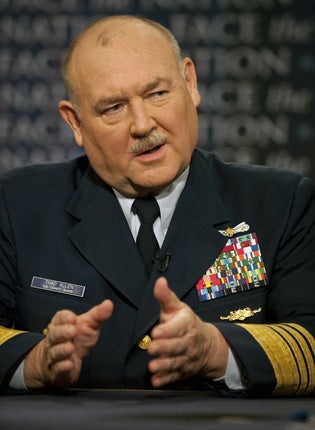Admiral Allen was about to retire, then came the giant oil spill ...

Your support helps us to tell the story
From reproductive rights to climate change to Big Tech, The Independent is on the ground when the story is developing. Whether it's investigating the financials of Elon Musk's pro-Trump PAC or producing our latest documentary, 'The A Word', which shines a light on the American women fighting for reproductive rights, we know how important it is to parse out the facts from the messaging.
At such a critical moment in US history, we need reporters on the ground. Your donation allows us to keep sending journalists to speak to both sides of the story.
The Independent is trusted by Americans across the entire political spectrum. And unlike many other quality news outlets, we choose not to lock Americans out of our reporting and analysis with paywalls. We believe quality journalism should be available to everyone, paid for by those who can afford it.
Your support makes all the difference.Ten days after the explosion that sank the Deepwater Horizon oil spill, as it became clear that leaking oil was going to pose a grave threat to the Gulf of Mexico, the Obama administration turned to Admiral Thad William Allen. Who else?
Allen, one of the US Coast Guard's most senior officials, had been the man who finally turned round the federal government's initially woeful response to Hurricane Katrina in the same region in 2005, calming the relief teams and projecting a cool, military effectiveness to a worried nation. Where the Bush administration had been damned as slow and incompetent in the early days of the Katrina disaster, Barack Obama's ministers were determined not to suffer the same criticism, so they reached early for the solution that their predecessors had found late.
And so the 61-year-old, weeks away from retirement from his post as head of the Coast Guard (his reward for a job well done after the hurricane), has been pitched into one last and, arguably, most difficult task.
With his clipped moustache and his clipped manner, Allen projects an apolitical and non-corporate competence for which the American public yearns, and his almost daily press briefings on the unfolding calamity present the latest information and best guesses in their unvarnished form.
Where BP has provided suspicious and ultimately unjustified optimism, and political press conferences generate emotional heat but little factual light, Allen more typically takes a grave tone. "I've never said this is going well," he declared last week. "We're making no illusions that this is anything other than a catastrophe, and we're addressing it as such, and we'll continue to do that."
None of which means that Allen is insulated entirely from the public fury that the disaster continues to generate. He is accused of being too trusting of BP's information and too close to its officers. Much was made of the fact he was recently spotted dining with the company's chief executive, Tony Hayward, and he has faced tougher questions as the incident has dragged on.
"The fact of the matter is, we have to have a cooperative, productive relationship for this thing to work moving forward," he said, when put on the defensive. "When I talk to him and ask for answers, I get them. You could characterise that as trust, partnership, cooperation, collaboration, whatever."
Allen's capital remains high, the result of his effective command of the Katrina effort. During that incident, he talked down the New Orleans mayor, who was suggesting people should return to the city even before electricity and water supplies were restored. And he showed an ability to tell truths to presidents and local residents alike.
The Coast Guard is in Allen's family. His father was chief damage controlman of the organisation, and the young Allen had little thought but to follow him into the Coast Guard Academy and then up through the ranks. His understated but mighty political skills were honed through numerous postings at the sharp end of public policy, notably in charge of the unit that brought 6-year-old Elian Gonzalez, a Cuban refugee, ashore in controversial circumstances in 1999, and then with responsibility for strengthening port security after the 9/11 terror attacks.
Most intriguing, in 2002, he was put in command of a mock disaster response effort in an exercise that the Coast Guard conducted with ExxonMobil, one of the other big three oil companies. In the exercise, conducted in New Orleans, one of the imaginary calamities was a well blowout in the Gulf of Mexico that leaked uncontrollably for 30 days. The current disaster has lasted almost twice as long as that. Allen's retirement date is officially 1 July. It doesn't look like he will be collecting a carriage clock that soon.
Join our commenting forum
Join thought-provoking conversations, follow other Independent readers and see their replies
Comments